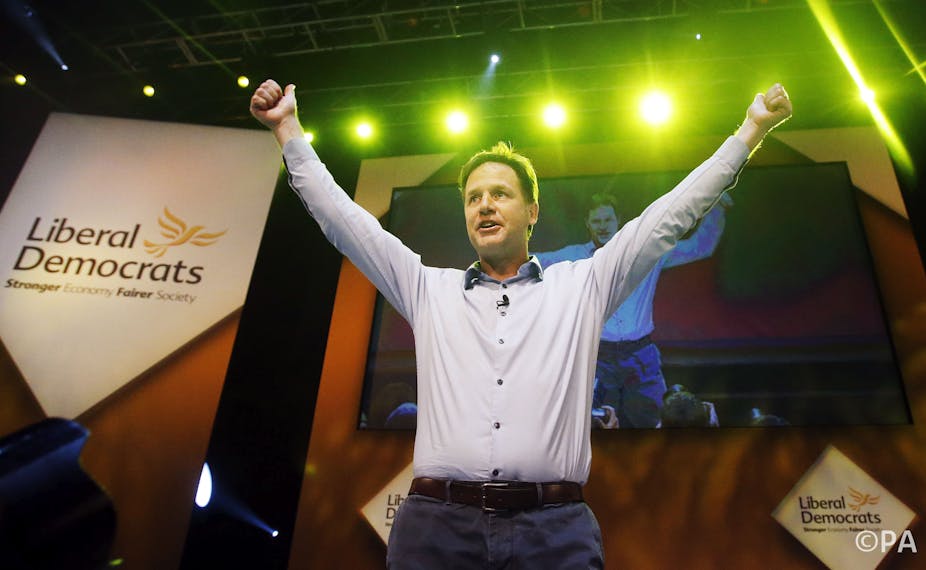How can it be that after plummeting to 6% in the polls, their lowest for two decades, the Liberal Democrats appeared to be in such good spirits at their autumn conference in Glasgow? You might even call some of them jolly. Given that a modern political party aims to win votes, win seats and to hold office, the mood on the ground seems little short of bizarre.
But this is a much misunderstood party and a closer look is needed to understand what to expect in the run up to the 2015 general election.
During this conference at least, the Lib Dems could pretend they were back in opposition. This is a party meeting after all, not the House of Commons. This was their chance to set out their stall for the campaign ahead, elect various internal committees, train hundreds of potential candidates, and somewhat uniquely among the main UK parties, vote on policy motions. This was their own private get together, and they were determined to enjoy it.
Giddy in Glasgow
Going last rather than first in the conference calendar appears to have played well for the party too. With a week gone by since David Cameron’s own speech, open season was apparently declared on the Conservatives during the Liberal Democrat conference. We’ve had Vince Cable on punitive taxation and immigration, Norman Baker on drugs policy and Clegg on the snooper’s charter. The party particularly seemed to enjoy rolling up its sleeves for a fight on traditional liberal turf over the European Court of Human Rights. This was Tory bashing at its most vigorous - an activity that has clearly been much missed.
Remember too, this is a small party that has become even smaller of late. The fair-weather friends, who jumped on the bandwagon when they were positioned to the left of Labour, have gone, leaving the Lib Dems squarely in the political centre. The party has been here before and actually, being unpopular, coming last and struggling for survival is what the Lib Dems are used to.
As Clegg pointed out, he is no longer new or young. Neither is his party. The Liberal Democrats have been around a while now, and despite many predictions to the contrary, they have not only survived, but have grown in maturity, professionalism and importance. In 1989 the party polled just 6.2% and came fourth behind the Green Party in the European elections, only to bounce back with a series of sensational by-election victories.
These legendary contests belong to a time when the electorate, and the political landscape, were different, but as much as the party should beware too much nostalgia, there are lessons to be learnt from history. Building local power bases and maximising the benefits of incumbency remain the foundations of Lib Dem support and these should be remembered as campaigning begins in the coming months.
It was clear from Nick Clegg’s closing speech that the Lib Dems consider the coalition to have been a success. The main complaint about the party prior to 2010 was that it had no experience in holding office and now it has. The party is proud of its achievements, taking credit for raising the income tax threshold, scrapping ID cards, introducing the pupil premium and now promising to make mental health a top priority. For a party that had been out of office for more than a lifetime, these are exciting times.
Battle ahead
It’s not all cheer though. The electorate has never really understood the Lib Dems. How can a political party not mind being unpopular? Why does it keep coming back for more when it’s already taken a pasting? To many, this is entirely counter-intuitive.
The electorate has also never forgotten the broken tuition fees promise and doesn’t particularly like Nick Clegg (to put it mildly). He now has to persuade voters that during their time in coalition, the Lib Dems have been the “opposition within” and have meaningfully restrained the Conservatives.
Getting this message across won’t be easy, but like the rest of his party this week, Clegg appears to relish the challenge – and he closed the Conference with one of his most robust and convincing speeches since becoming leader.
Clegg continues to smile because he knows, even if the electorate doesn’t, that he does not have to win the election. All he has to do is win enough votes to play a part in the next government. Polling at just 6% across the country won’t matter so long as the party can return a sufficient number of MPs to carry real weight in another hung parliament.
The party leadership has to demonstrate that it can work with the Conservatives and campaign against them at the same time. The Lib Dems have had their fun in Glasgow, but they know they now have to dust their uniforms down, leave the playground and go back to school to implement the remainder of the coalition agreement.
They are showing no signs of preparing for a pre-electoral pact with either party. Indeed, they have everything to play for, claiming the Conservatives are lurching to the right to appease UKIP, while the Labour party slides to the left under Ed Miliband. Occupying the centre, with sufficient flexibility to do a deal with their bigger rivals, is familiar territory for Lib Dems. It is what they have spent their political lives preparing for and may well feature in the aftermath of the general election of 2015 too.

